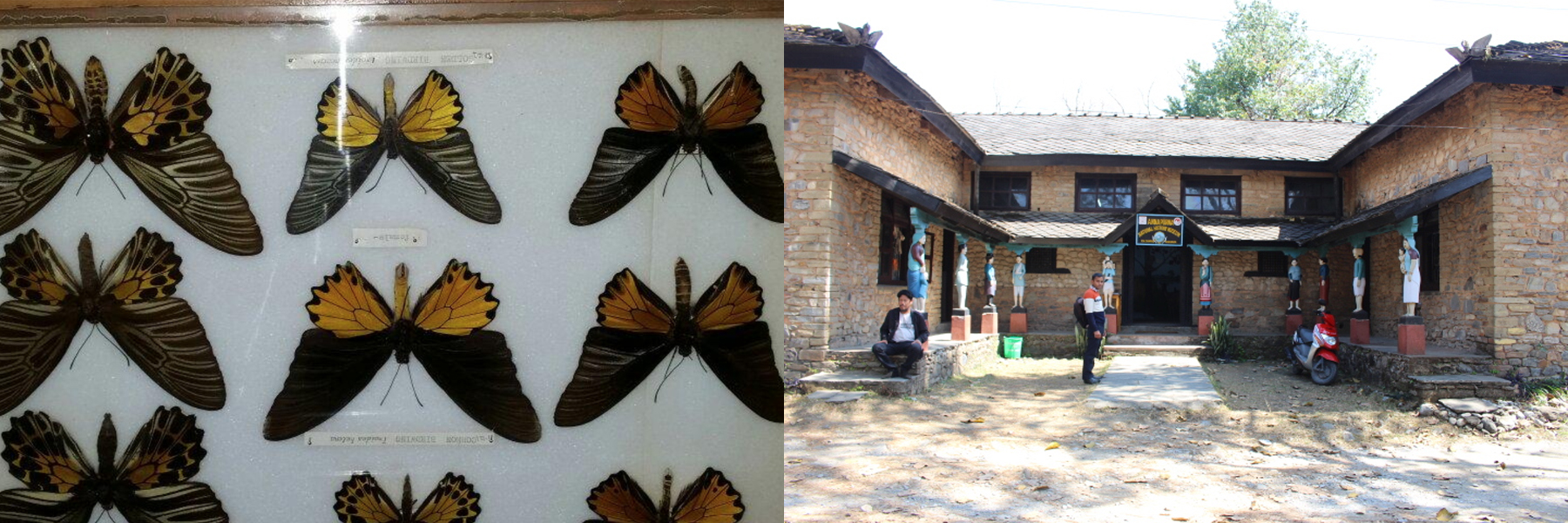Pokhara is a unique place where you can visit four distinct museums, each with its own significance and personality. The nature and collection established in the Annapurna Butterfly Museum, Pokhara Regional Museum, Gurkha Memorial Museum, and International Mountain Museum are all different. It’s the ideal way to spend your day in Pokhara, exploring the city’s culture and history.
Nepal, with its lush green meadows, snow-capped peaks, and teeming wildlife, will enchant you. Pokhara, Nepal’s tourism hub, is home to a number of museums, the most notable of which being the Annapurna Butterfly Museum. The Annapurna Butterfly Museum which is located on the Prithvi Narayan University Campus, has nearly the whole of Nepal’s 660 indigenous butterfly and moth varieties! The Annapurna Butterfly Museum was founded in 1965 by Dorothy Mierow, an American Peace Corps Volunteer, on the Prithvi Narayan Campus for the use of institution as well as the residents of Pokhara and the outlying neighborhoods. Pokhara did not have roads or power at the time. There were few options of amusement other than fairs and religious holidays, therefore many of the figures and basic exhibitions were for schoolchildren. The museum’s displays also presented a learning experience for the ignorant to learn more about the world outside their immediate surroundings.
A collection of the Parnassius group, which could also be seen here, highlights the world’s mountain butterflies. Leaf butterflies and swordtails from different more tropical sections of Southeast Asia have been added to the Oriental region’s species list. Visitors will also be able to observe a variety of moth species as well as some fascinating dragonflies. This is Nepal’s most comprehensive and well-organized collection. On plywood strips and charts on the walls and the ceilings, around 70 flora and 150 birds from the region are shown. Dr. Bob Flemming Sr. has contributed 56 study bird skins that will be of interest to ornithologists.
The museum has utilized life-size images on plywood and cement relief instead of stuffed animals since stuffed creatures are difficult to produce and keep and need the death of an animal. In this fashion, around 90 distinct creatures are portrayed. There are additional charts that depict animals, fish, and snakes from the neighboring zoogeographic areas that are connected to altitude zones. Wild and farmed sheep and goats were used to demonstrate biodiversity.
Visitors may quickly become familiar with the many types of native moths and butterflies in a unique environment thanks to the butterfly arrangement in the museum, which offers them a chocolate-box perspective. The Attacus Atlas, housed at the Annapurna Butterfly Museum, is the world’s biggest moth in terms of wing span. The Annapurna Butterfly Museum, which offers a one-of-a-kind experience to tourists, is a must-see for butterfly and moth enthusiasts visiting Pokhara.
Location and Entry Fees: The museum is located around 4.5 miles from Lakeside’s major tourist zone. The facility is open during normal business hours and admission is by donation.
Colin Smith, nicknamed Mr Butterfly and Butterfly Baje, has been preserving the butterfly wonderland for years. The museum does have its beautiful collection and the never stream of pleased visitors who spend many hours together around the museums and all thanks to their preservation efforts.
Moreover, the Annapurna Butterfly Museum is notable for its unique collection, which includes Nepal’s biggest butterfly, Corman Birdming. The Annapurna Butterfly Museum has a one-of-a-kind collection. Isn’t it lovely to have a swarm of butterflies flying around you in a beautiful setting? We will definitely suggest you to visit this amazing and beautiful museum while you are on your visit to the beautiful city Pokahra.
-By: Saru Niraula for Land Nepal




